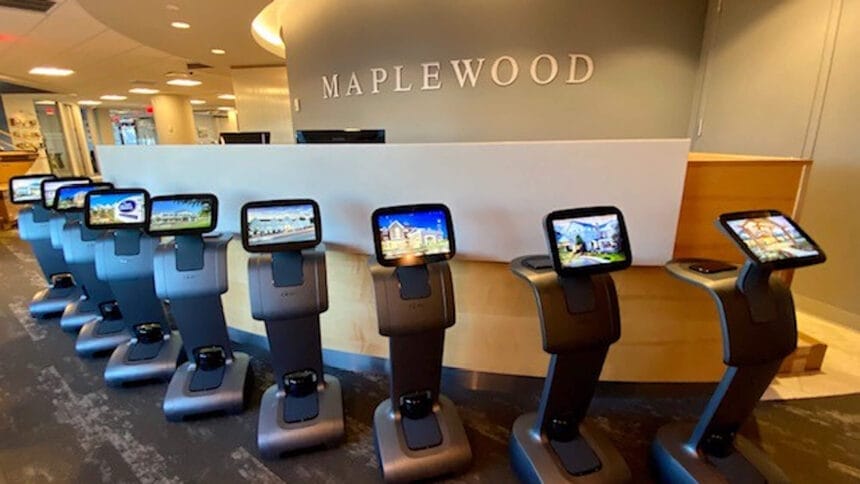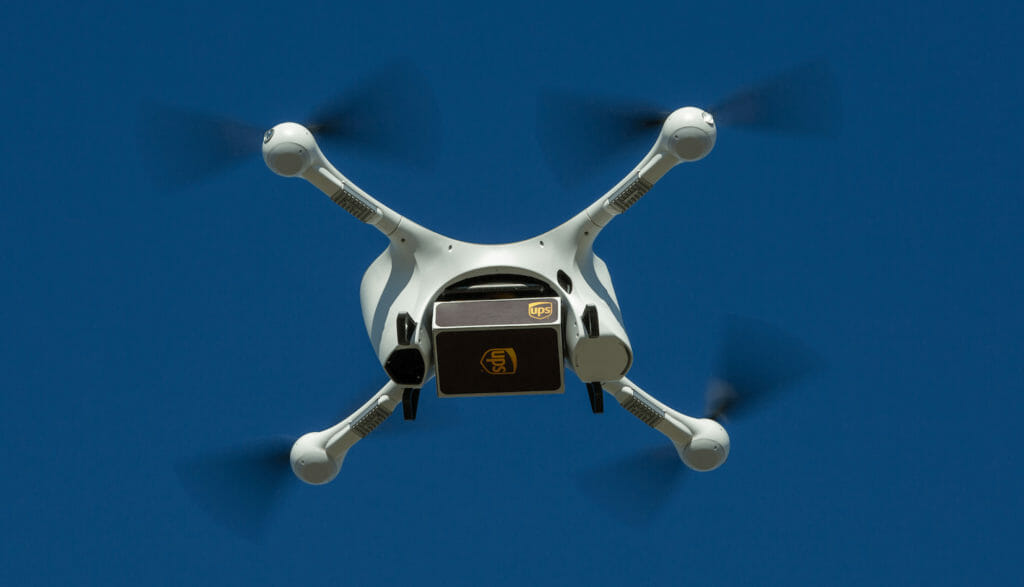
Robots and drones are just two types of technology being called into service to address challenges presented by the COVID-19 pandemic.
Shelter-in-place, social distancing and no-visitor orders have senior living communities looking for new options to keep residents engaged and connected.
Connecticut-based Maplewood Senior Living found a creative way to support its residents while maintaining their overall health and wellness by introducing robot “friends” to its 15 communities in five states.
The Temi personal robots, powered by technology from Massachusetts-based Connected Living, come with pre-configured tablets, Alexa-enabled skills, a TV channel with programming designed for seniors, and a smartphone app to help seniors stay connected with their families.
Maplewood originally planned to launch the Temi robots as a unique feature at Inspīr Carnegie Hill, a soon-to-be-opened, luxury modern senior living residence in Manhattan, said Shane Herlet, Maplewood’s chief operating officer. The robots initially were going to be rolled out primarily for individualized education and entertainment, then phased into programming at suburban Maplewood Senior Living communities.
Brian Geyser, vice president of clinical innovation and population health at Maplewood Senior Living, said the company was looking into robotics, knowing it would play a role in senior living in the future. With the COVID-19 pandemic, he said it was an opportunity to “pull the trigger” on a program to help residents cope with social distancing.
“They’re cute. They’re entertaining. The residents love them,” Geyser said. “They have kind of personalities. They tell jokes and they’ll give the weather and they’ll ask questions. They’re just nice to have around.”
Temi interacts with residents via autonomous navigation, including 3-D mapping, navigation, user detection and tracking, obstacle avoidance and path planning; dynamic video, audio and artificial intelligence. The Temi robots cruise around the community interacting with residents and have become part of the fabric of each community now, Geyser said.
Herlet said although the robots don’t replace human interaction, they do help residents feel more connected by allowing more frequent video chats with families, physicians and the internal teams. The robots also deliver packages to residents’ rooms, and residents are learning how to train them to do certain tasks, such as picking up items from the dining room.
“While the robots provide a real functionality to normalizing daily life with strict social distancing and social isolation rules, the real benefit that we were hoping for and are seeing is their ability to lift the spirits of the residents,” Herlet said. “We see our residents dance to the music Temi plays, laugh along with its jokes, follow Temi-led hallway exercise sessions, and utilize the video chat function to see family members who are temporarily not able to visit.”
According to Connected Living, the virtual learning and engagement opportunities offered include live stream religious services, entertainment, education, and art and music therapy, including live concerts, lectures and virtual tours of museums and art galleries. The devices also can offer programming to reduce stress and anxiety, including guided meditation and yoga. Independent programming to keep residents engaged in their rooms or apartments includes reading materials, crossword puzzles, Sudoku, online trivia and gaming resources.
The robots also can connect residents with telehealth services.
“Temi allows us to safely check temperatures at the door, set up family and doctor social or health visits, and interact with unlimited engagement content,” said Connected Living CEO and co-founder Sarah Hoit.
“We know that people who are actively engaged lead better lives, plain and simple. While we already rely heavily on technology to keep our residents engaged, the outbreak of the coronavirus has inspired us to find creative new ways to do so, while keeping residents safe,” Maplewood President and CEO Gregory D. Smith said.
UPS, CVS launch residential drone delivery service to Florida retirement community as part of coronavirus response

Meanwhile, in Florida, residents of The Villages, one of the country’s largest retirement communities, can begin receiving prescription deliveries via drones in May, UPS announced Monday.
Deliveries will be dropped autonomously by drone at a location near the Sumter County, FL, retirement community from a nearby CVS pharmacy. Initially, a UPS ground vehicle will complete the delivery to the doorsteps of the community’s 135,000 residents. The service will involve UPS subsidiary UPS Flight Forward, established in 2019, and CVS Health Corp. subsidiary CVS Pharmacy, using the M2 drone system developed by UPS partner Matternet, a California-based aerial delivery company.
The first flights will be less than a half mile with the potential to expand deliveries from two additional CVS pharmacies in the area, UPS said. The ultimate goal of the program is to make deliveries directly, with the drone lowering packages by winch, according to the company.
“Our drone delivery service will help CVS provide safe and efficient deliveries of medicines to this large retirement community, enabling residents to receive medications without leaving their homes,” Scott Price, UPS chief strategy and transformation officer, said in a statement.
The drone service program supports social-distancing during the COVID-19 pandemic and is meant to provide faster, same-day delivery of time- or temperature-sensitive medications. The Federal Aviation Administration approved the program under its Part 107 rules for small unmanned aircraft “to operate through the pandemic and explore ongoing needs after that period.”
The service follows a similar pilot program from UPSFF and CVS to a North Carolina retirement community resident in November.
“Now more than ever, it’s important that our customers have access to their prescriptions,” Jon Roberts, CVS Health executive vice president and chief operating officer, said in a statement. “In addition to our in-store pickup, free delivery services and drive-through pickup, this drone delivery service provides an innovative method to reach some of our customers.”
CVS is the first retail partner using drone delivery with UPSFF, although UPSFF and Matternet have been working with the University of California San Diego Health System and WakeMed Hospital in Raleigh, NC, where they have completed more than 3,700 flights since launching service there in March 2019.
UPSFF and Matternet are now testing service in Virginia with the U.S. government and partners to determine how drones can assist medical professionals in the fight against COVID-19.


